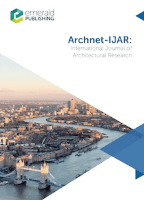
Archnet-IJAR International Journal of Architectural Research
Scope & Guideline
Unlocking the potential of interdisciplinary architectural research.
Introduction
Aims and Scopes
- Sustainable Architecture and Urban Design:
The journal emphasizes research on sustainability in architectural practices and urban design, exploring innovative approaches to mitigate climate change and promote environmentally friendly solutions. - Architectural Education and Pedagogy:
A significant focus is on the evolution of architectural education, examining pedagogical strategies that enhance learning experiences and prepare students for contemporary challenges in the field. - Cultural and Social Contexts of Architecture:
The journal investigates the relationship between architecture and cultural identity, exploring how built environments influence and are influenced by social dynamics and cultural narratives. - Technological Integration in Architecture:
Research on the integration of digital technologies in architectural design and construction processes is a core area, highlighting advancements in tools such as Building Information Modeling (BIM) and virtual reality. - Community Engagement and Participatory Design:
The journal promotes studies that emphasize participatory design processes, focusing on community involvement and the impact of architecture on social cohesion and well-being. - Health and Well-being in Built Environments:
Research on how architectural design affects health outcomes is increasingly significant, examining the role of environments in promoting physical and mental well-being.
Trending and Emerging
- Biophilic Design and Well-being:
An increasing number of studies focus on biophilic design principles and their impact on well-being, demonstrating a growing recognition of the importance of nature in built environments. - Inclusive and Gender-sensitive Design:
There is a notable trend towards researching inclusive design practices, particularly regarding gender and accessibility, reflecting a broader societal push for equity in architectural practices. - Digital and Virtual Architectural Practices:
Research into the use of digital technologies and virtual environments in architectural education and practice is expanding, indicating a shift towards innovative methodologies and tools. - Sustainability and Climate Resilience:
A significant emphasis on sustainability, particularly in relation to climate change and urban resilience, is emerging, highlighting the need for adaptive strategies in architecture and urban planning. - Community-Centric Urban Planning:
Emerging themes focus on community engagement and participatory planning processes, reflecting a shift towards valuing local voices and experiences in urban development.
Declining or Waning
- Traditional Architectural Styles and Histories:
There has been a noticeable decrease in papers focusing solely on traditional architectural styles and historical analyses, suggesting a shift towards contemporary and innovative design approaches. - Purely Aesthetic Evaluations of Architecture:
Research centered on aesthetic evaluations without consideration of functionality or social impact appears to be declining, indicating a growing preference for holistic assessments that integrate multiple dimensions. - Micro-scale Urban Studies:
Studies focusing on micro-scale urban environments, such as small public spaces or specific building types, have decreased, possibly as the journal shifts towards broader urban studies and systemic approaches. - Architectural Theory Disconnected from Practice:
There seems to be a waning interest in purely theoretical explorations of architecture that do not connect to practical implications or real-world applications.
Similar Journals

i2 Investigacion e Innovacion en Arquitectura y Territorio
Advancing knowledge at the intersection of architecture and territory.i2 Investigacion e Innovacion en Arquitectura y Territorio is a leading open-access journal published by the University of Alicante, dedicated to advancing research and innovation in the fields of architecture and territorial development. Since its inception in 2013, this journal has aimed to provide a robust platform for scholarly discourse, promoting interdisciplinary approaches that connect academic insights with practical applications in urban planning and environmental design. With its commitment to accessibility, the journal ensures that cutting-edge findings and case studies are readily available to researchers, professionals, and students alike, fostering collaboration and informed decision-making. As the landscape of architecture and geography continues to evolve, the i2 journal stands out as a crucial resource for enhancing knowledge and cultivating innovative practices in these dynamic fields.

ARCHITECTURAL RECORD
Cultivating Critical Perspectives in the Built EnvironmentARCHITECTURAL RECORD, published by McGraw Hill Inc, stands as a vital resource in the field of architecture and design, offering insightful perspectives and critical analyses that cater to architects, designers, and academia alike. With an ISSN of 0003-858X, this prestigious journal has been a cornerstone for the architectural community, providing a blend of contemporary practices and theoretical frameworks since its inception. Although it is not currently available through Open Access, its rich content contributes to the ongoing dialogue in both the Visual Arts and Performing Arts, as well as Engineering and Architecture disciplines. The journal's historical impact can be seen through its wide readership and influence in shaping architectural discourse, making it a highly regarded publication for professionals and students in the field. As a beacon of innovative practices, ARCHITECTURAL RECORD continues to inspire and educate, even despite its coverage discontinuation in Scopus since 2018.
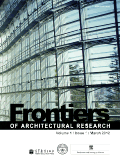
Frontiers of Architectural Research
Illuminating the Path of Architectural AdvancementFrontiers of Architectural Research, published by KEAI PUBLISHING LTD, stands at the forefront of interdisciplinary scholarship, addressing contemporary challenges in the fields of architecture, urban studies, building and construction, and archaeology. Since its establishment in 2012, this open-access journal has rapidly gained recognition, achieving prestigious rankings in the 2023 category quartiles, including Q1 placements in both Architecture and Archaeology. With an impressive Scopus rank of #5 out of 354 in Archaeology and #10 out of 189 in Engineering - Architecture, it demonstrates its significant influence and contribution to advancing architectural research. Frontiers of Architectural Research embraces a broad scope that fosters innovative discourse and practical solutions, catering to a diverse audience of researchers, professionals, and students keen on exploring the intersection of culture, environment, and technology. By ensuring immediate access to research findings, the journal not only enhances the visibility of scholarly work but also encourages collaborative dialogues that shape the future of architectural practice.

Dearq
Unveiling the Future of Planning and GeographyDearq, an esteemed academic journal published by UNIV ANDES, is recognized as a vital source of knowledge in the fields of Architecture, Geography, Planning, and Urban Studies. As an Open Access journal since its inception in 2007, it provides researchers, professionals, and students with a platform to disseminate high-quality research that fosters innovation and progress in these dynamic disciplines. With an impressive track record of converging research from 2019 to 2024, Dearq currently holds a Q2 ranking in Architecture and Q3 rankings in both Geography, Planning, and Development, as well as Urban Studies for 2023. This editorial momentum reflects its commitment to advancing scholarly dialogue and critical inquiry. Located in Colombia and fostering a global perspective, Dearq is dedicated to enriching the academic landscape, making it an indispensable resource for anyone seeking to explore and understand complex socio-environmental issues.
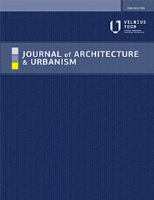
Journal of Architecture and Urbanism
Transforming Ideas into Architectural RealitiesThe Journal of Architecture and Urbanism, published by VILNIUS GEDIMINAS TECH UNIV, stands as a pivotal resource for scholars and practitioners in the fields of architecture and urban studies. Since its inception in 2012, the journal has committed to advancing research and discourse on the design, planning, and functionality of urban environments, reflecting a dedicated focus on contemporary challenges in architecture and urbanism. With an impressive open access model implemented since 2018, it ensures that innovative research is accessible to a global audience, fostering collaboration and knowledge exchange. The journal boasts a commendable reputation, categorized in the Q2 quartile for Architecture and Q3 in both Geography, Planning and Development and Urban Studies as of 2023, while maintaining respectable Scopus rankings. Addressing key themes from sustainable design to socio-economic impacts on urban spaces, the journal aims to inspire new models and solutions that meet the evolving needs of growing urban populations. This is a must-read for anyone engaged in the intersection of architecture and urban development.
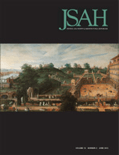
JOURNAL OF THE SOCIETY OF ARCHITECTURAL HISTORIANS
Advancing Knowledge in Architectural Heritage and TheoryJOURNAL OF THE SOCIETY OF ARCHITECTURAL HISTORIANS, published by the SOCIETY OF ARCHITECTURAL HISTORIANS, serves as a premier platform for the dissemination of scholarly research and critical discourse in the fields of architecture and architectural history. Established in 1970, this journal has undergone significant evolution, focusing on interdisciplinary studies that explore architectural heritage, theory, and practice. With a current impact factor that places it within the Q2 category in both History and Visual Arts and Performing Arts, as well as Q3 in Architecture, the journal maintains a robust reputation among academics and professionals alike. Although it operates under traditional access models, its essential role in fostering a deep understanding of architectural narratives and their socio-cultural contexts remains unparalleled. The journal also ranks favorably in Scopus, highlighting its importance in the arts and humanities, as well as engineering disciplines related to architecture. By bridging the gap between historical inquiry and contemporary architectural criticism, the JOURNAL OF THE SOCIETY OF ARCHITECTURAL HISTORIANS continues to be a vital resource for researchers, professionals, and students endeavoring to enrich their knowledge and contribute to this dynamic field.
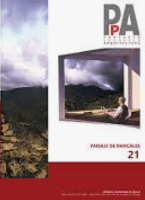
Proyecto Progreso Arquitectura
Championing open access to inspire architectural innovation.Proyecto Progreso Arquitectura, an esteemed academic journal published by UNIV SEVILLA, EDITORIAL, is dedicated to advancing the fields of Architecture, Arts and Humanities, History, Urban Studies, and Visual Arts. With an Open Access model since 2010, this journal facilitates the dissemination of innovative research and critical discourse among a global audience, fostering collaboration and insight within the academic community. Operating from Seville, Spain, the journal has successfully carved a niche in the architectural and design studies landscape, currently positioned in the Q3 category in Architecture and Urban Studies, and Q2 in History and Visual Arts as of 2023, demonstrating its growing impact and reputation. With an ISSN of 2171-6897 and an E-ISSN of 2173-1616, it also ranks commendably in Scopus across various disciplines, offering readers an invaluable resource for scholarly articles that contribute to the vibrant dialogues in architecture and its intersection with societal developments. The journal's approach not only encourages academic rigor but also embraces the practical implications of research, making it an essential read for researchers, practitioners, and students alike.

LOTUS INTERNATIONAL
Advancing Knowledge in the Heart of Milan's Cultural LandscapeLOTUS INTERNATIONAL is a distinguished journal published by EDITORIALE LOTUS, focusing on the dynamic fields of Architecture and Visual Arts and Performing Arts. With its ISSN 1124-9064, this scholarly periodical has been a platform for innovative research and discourse since its inception in 2002, resuming publication in 2021 after a brief hiatus. Based in the cultural hub of Milan, Italy, LOTUS INTERNATIONAL aims to bridge theoretical frameworks and practical applications, thereby fostering a deeper understanding of creative practices and their implications in modern society. As a Q4 ranked journal in its respective categories for 2023, it provides a unique opportunity for researchers and professionals to contribute to an evolving dialogue, even at the foundational percentile levels within its Scopus rankings. Although not an open-access journal, LOTUS INTERNATIONAL remains committed to disseminating valuable insights and advancing knowledge in the creative disciplines. With an accessible format, it invites a diverse audience, including students, to engage with emerging concepts that shape the future of art and architecture.

ACE-Architecture City and Environment
Bridging Architecture, Urban Studies, and Environmental InsightsACE-Architecture City and Environment, published by Universitat Politècnica de Catalunya in Spain, serves as an essential repository for innovative research and insights that intersect the fields of architecture, urban studies, and environmental planning. Since its establishment as an Open Access journal in 2006, it has facilitated widespread accessibility to scholarly work, fostering a collaborative and inclusive academic community. The journal has consistently maintained a prominent standing within its field, reflected in its 2023 Quartile rankings—, Q3 in Geography, Planning and Development, and Q2 in Urban Studies. With a publication horizon extending from 2011 to 2024 and an impressive Scopus ranking among peers, it offers a comprehensive platform for researchers to disseminate their findings and engage with contemporary challenges in urban environments. ACE is pivotal for professionals and students alike, striving to shape the future of sustainable architecture and urban planning through rigorous scholarship.

Contexto-Revista de la Facultad de Arquitectura Universidad Autonoma de Nuevo Leon
Connecting Research, Practice, and Visual ArtsContexto-Revista de la Facultad de Arquitectura Universidad Autonoma de Nuevo Leon is a prominent open-access journal published by the Universidad Autonoma de Nuevo Leon, Faculty of Architecture, dedicated to the fields of architecture, urban studies, and visual arts. Since its establishment, the journal has steadily contributed to the discourse in these interconnected domains, particularly given its commitment to open access since 2011, allowing for wider dissemination of knowledge and research. With its ISSN 2007-1639, Contexto has evolved to encompass a range of topics pertinent to contemporary architectural practices and urban development trends, reflecting its vision to foster innovative dialogues and critical analyses among researchers, practitioners, and students. With a current Scopus ranking showcasing its influence—specifically a Q4 classification in Architecture and Urban Studies, and a Q2 in Visual Arts and Performing Arts—this journal serves as a vital resource for academia and industry alike. Authors and readers are encouraged to engage with its dynamic content and contribute to its ongoing mission of enriching the architectural and urban narratives within Mexico and beyond.